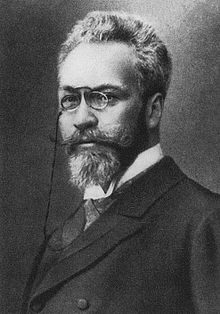Minkowski Prize
This article relies too much on references to primary sources. (February 2020) |
| Minkowski Prize | |
|---|---|
 Oskar Minkowski | |
| Awarded for | Prize awarded for research contributing to the advancement of knowledge concerning diabetes mellitus |
| Sponsored by | European Association for the Study of Diabetes |
| Website | https://www.easd.org/prizes/minkowski.html |
The Minkowski Prize is given by the European Association for the Study of Diabetes (EASD) in recognition to research which has been carried out by a person normally residing in Europe, as manifested by publications which contribute to the advancement of knowledge concerning diabetes mellitus. The Prize honors the name of Oskar Minkowski (1858–1931), a physician and physiologist who was the discoverer of the role of pancreas in the control of glucose metabolism. It has been awarded annually since 1966, and the winner is invited to pronounce a Minkowski Lecture during the EASD Annual Conference. It is traditionally seen as the most prestigious European prize in the field of diabetes research.
Since 1966, the award is sponsored by a pharmaceutical company Sanofi-Aventis. The prize consists of a certificate and 20,000 euros plus travel expenses. The candidate must be less than 45 years of age on 1 January of the year of award. Self-nomination is possible.
Winners[]
With the city where the prize was awarded (Annual Conference), name and country.[1][2]
- 1966 Aarhus – Philip Randle (United Kingdom)
- 1967 Stockholm – E. R. Froesch (Switzerland)
- 1968 Louvain – (Sweden)
- 1969 Montpellier – (Sweden)
- 1970 Warsaw – (Switzerland)
- 1971 Southampton – Charles Nicholas Hales (United Kingdom)
- 1972 Madrid – W. J. Malaisse (Belgium)
- 1973 Brussels – Lelio Orci (Switzerland)
- 1974 Jerusalem – E. Cerasi (Sweden)
- 1975 Munich – P. Freychet (France)
- 1976 Helsinki – (Germany)
- 1977 Geneva – (Sweden)
- 1978 Zagreb – (Denmark)
- 1979 Vienna – (United Kingdom)
- 1980 Athens – I.-B. Taljedal (Sweden)
- 1981 Amsterdam – Pierre De Meyts (Belgium)
- 1982 Budapest – Gian Franco Bottazzo (United Kingdom)
- 1983 Oslo – (United Kingdom)
- 1984 London – (Denmark)
- 1985 Madrid – (France)
- 1986 Rome – (Belgium)
- 1987 Leipzig – (Switzerland)
- 1988 Paris – (United Kingdom)
- 1989 Lisbon – H. U. Häring (Germany)
- 1990 Copenhagen – (Switzerland)
- 1991 Dublin – (France)
- 1992 Prague – (Belgium)
- 1993 Istanbul – Hannele Yki-Järvinen (Finland)
- 1994 Düsseldorf – (Denmark)
- 1995 Stockholm – John Todd (United Kingdom)
- 1996 Vienna – Patrik Rorsman (Denmark)
- 1997 Helsinki – P. Froguel (France)
- 1998 Barcelona – (France)
- 1999 Brussels – R. Scharfmann (France)
- 2000 Jerusalem – Helena Edlund (Sweden)
- 2001 Glasgow – Juleen R. Zierath (Sweden)
- 2002 Budapest – Bart O. Roep (The Netherlands)
- 2003 Paris – (Germany)
- 2004 Munich – (United Kingdom)
- 2005 Athens – (Denmark)
- 2006 Copenhagen – Michael Roden (Austria)
- 2007 Amsterdam – (Switzerland)
- 2008 Rome – (Germany)
- 2009 Vienna – (Italy)
- 2010 Stockhom - (United Kingdom)
- 2011 Lisbon - Naveed Sattar (United Kingdom}
- 2012 Berlin - (United Kingdom)
- 2013 Barcelona - Miriam Cnop (Belgium)
- 2014 Vienna - Anna Gloyn (United Kingdom)
- 2015 Stockholm - (Germany)
- 2016 Munich - (Netherlands)
- 2017 Lisbon - (United Kingdom)
- 2018 Berlin - (Sweden)
- 2019 Barcelona - (Denmark)
- 2020 Virtual Meeting - (Italy)
References[]
- ^ Minkowski Prize. easd.org
- ^ "Minkowski Prize". EASD. Retrieved 31 October 2021.With list of awardees
- Science and technology awards
- Diabetes
- Awards established in 1966
- 1966 establishments in Europe